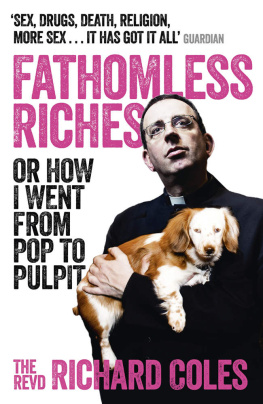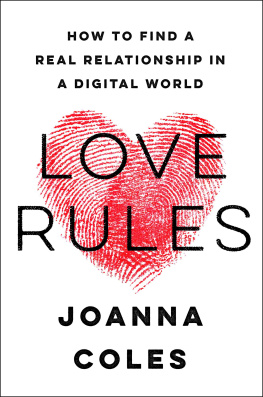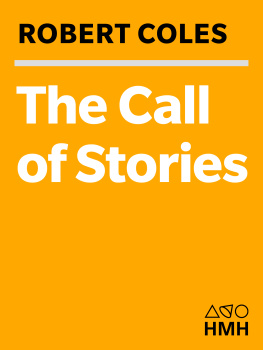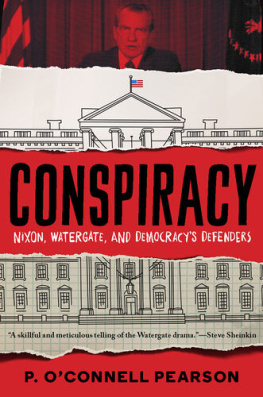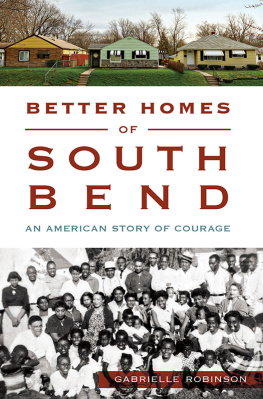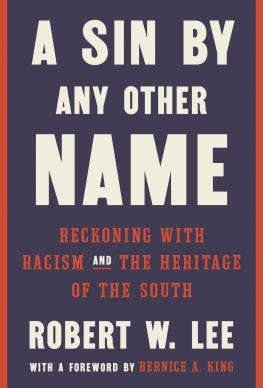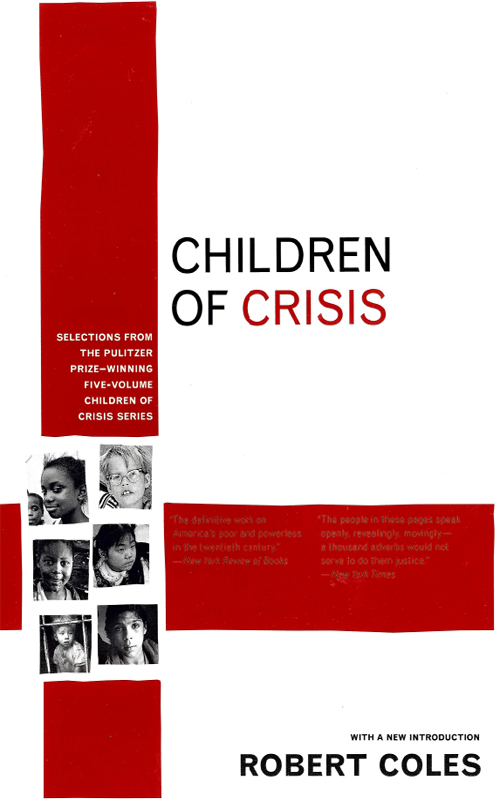Copyright 2003 by Robert Coles
All rights reserved. No part of this book may be reproduced in any form or by any electronic or mechanical means, including information storage and retrieval systems, without permission in writing from the publisher, except by a reviewer who may quote brief passages in a review.
First eBook Edition: November 2009
Hachette Book Group
237 Park Avenue
New York, NY 10017
Visit our website at www.HachetteBookGroup.com.
The author is grateful for permission to reprint as an epigraph the following previously copyrighted material: excerpt from William Carlos Williamss Paterson, copyright 1948 by William Carlos Williams. Reprinted by permission of New Directions Publishing Corp.
ISBN: 978-0-316-09049-0
Bruce Springsteens America
Lives of Moral Leadership
The Moral Intelligence of Children
The Call of Service: A Witness to Idealism
Their Eyes Meeting the World: The Drawings and Paintings of Children (with Margaret Sartor)
The Call of Stories: Teaching and the Moral Imagination
The Spiritual Life of Children
Rumors of Separate Worlds (poems)
Anna Freud: The Dream of Psychoanalysis
The Child in Our Times: Studies in the Development of Resiliency (edited with Timothy Dugan)
That Red Wheelbarrow: Selected Literary Essays
Harvard Diary: Reflections on the Sacred and the Secular
Times of Surrender: Selected Essays
In the Streets (with Helen Levitt)
Dorothy Day: A Radical Devotion
Simone Weil: A Modern Pilgrimage
The Political Life of Children
The Moral Life of Children
Agee (with Ross Spears)
The Doctor Stories of William Carlos Williams (editor)
Dorothea Lange
Women of Crisis, II: Lives of Work and Dreams (with Jane Coles)
Flannery OConnors South
Walker Percy: An American Search
Women of Crisis, I: Lives of Struggle and Hope (with Jane Coles)
The Last and First Eskimos (with Alex Harris)
A Festering Sweetness (poems)
Privileged Ones: The Well-Off and the Rich in America (Volume V of Children of Crisis)
Eskimos, Chicanos, Indians (Volume IV of Children of Crisis)
The Minds Fate: Ways of Seeing Psychiatry and Psychoanalysis
William Carlos Williams: The Knack of Survival in America
Irony in the Minds Life: Essays on Novels by James Agee, Elizabeth Bowen, and George Eliot
The Darkness and the Light (with Doris Ulmann)
The Buses Roll (with Carol Baldwin)
The Old Ones of New Mexico (with Alex Harris)
A Spectacle Unto the World: The Catholic Worker Movement (with Jon Erikson)
Twelve to Sixteen: Early Adolescence (with Jerome Kagan)
Farewell to the South
The South Goes North (Volume III of Children of Crisis)
Migrants, Sharecroppers, Mountaineers (Volume II of Children of Crisis)
The Geography of Faith (with Daniel Berrigan)
The Middle Americans (with Jon Erikson)
Erik H. Erikson: The Growth of His Work
Drugs and Youth (with Joseph Brenner and Dermot Meagher)
Wages of Neglect (with Maria Piers)
Teachers and the Children of Poverty
Uprooted Children
The Image Is You
Still Hungry in America
Children of Crisis, Volume I: A Study of Courage and Fear
FOR CHILDREN
Dead End School
The Grass Pipe
Saving Face
Riding Free
Headsparks
To the children across America who have had so much to teach us and whose lives have become our nations history.
In loving memory of Jane, and to our children and grandchildren; and with grateful thanks to Eric H. Erikson and Anna Freud for their constant encouragement, instruction.
With grateful thanks also to Terry Adams, whose careful interest and concern very much enabled and gave shape to this book.
Outside
outside myself
there is a world,
he rumbled, subject to my incursions
a world
(to me) at rest,
which I approach
concretely
Book Two,
Paterson
William Carlos Williams
All that each person is, and experiences, and shall never experience, in body and mind, all these things are differing expressions of himself and of one root, and are identical: and not one of these things nor one of these persons is ever quite to be duplicated, nor replaced, nor has it ever quite had precedent: but each is a new and incommunicably tender life, wounded in every breath and almost as hardly killed as easily wounded: sustaining, for a while, without defense, the enormous assaults of the universe.
Let Us Now Praise Famous Men
James Agee
What follows are words that were meant to give an account of American children of various backgrounds who grew up in the 1960s and 1970s. Those boys and girls became, in their own way, teachers. They sometimes spoke loud and clear about what crossed their minds, or they used crayons or pencils or paintbrushes to show through artistic representation what they saw, experienced, wanted to convey through portraits of themselves, of others, or through the rendering of particular faces, buildings, scenes. Over time the stories of those children, their remarks, as heard by the doctor who came to know them, became the subject matter of a series of five books, each called Children of Crisis, with the subtitles spelling out one or another aspect of a nations social geography: the Souths embattled racial climate of opinion and habit during the 1960s; the rural life of Dixie and beyond up the hollows of Appalachia, and in the farms across the nation that require the traveling hands of laboring men and women (and sometimes children, too) if crops are to be planted, harvested; the cities of the North, which received so many thousands of needy and vulnerable families, eager to try the new kind of life available away from sharecropper cabins, migrant labor settlements, or the mountain hollows of, say, West Virginia, Kentucky; out West, the people who claimed the land, or worked it, now called Native Americans, once described as Indians, or now called Spanish-speaking citizens, once summoned as Chicanos, and up Alaska, those whose Eskimo bearings in distant communities gave way to the accessible life of a far northern states busy commercial and even industrial life; and finally, those who, across a continent, have risen to the top, acquired money and the privileges that go with it the not rare sagas of rags to riches that a nation has long savored, treasured.
In a sense, then, the Children of Crisis books tell a story of a nations people, whose lives take place under a broad variety of circumstances; but those volumes, published between 1967 and 1977, also tell another story, that of a physician who left the bounds of a particular profession as it once exerted its hold on one of its practitioners only to find himself taken up in the somewhat different manner that social observers find convenient, useful. Since all stories have their beginnings, perhaps it is best to go way back to the very start of this one to a time that preceded by almost five years any of the work and writing that would initiate the Children of Crisis series. In 1955, I was learning to be a pediatrician at the University of Chicagos Billings Hospital. One of my young patients was dying of leukemia and had no chance of survival. He was ten years old, Jimmie was, a policemans son, quite lively in nature, and ever ready to converse with his hardworking physician, who was constantly worried about what to do, when, on behalf of a whole ward full of desperately ill youngsters. I can still see his alert, watchful face as it scrutinized my worried effort to hear his heart, elicit the reflexes of his arms, his legs, keep track of his pulse, and his sweaty, blotched skin. Yet for all the exhaustion exacted by his mortal illness, he could be not only friendly, but ever forthcoming in response to my neophytes questions. Once, as we talked, he asked a favor of me: Would I want to meet his three best buddies?



